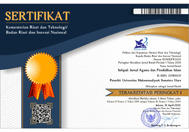Application of AIR Learning Model to Understanding the History of the Establishment of the Abbasiyah Dynasty
Abstract
This study purpose to determine the effect of the Auditory, Intellectually, Repitition (AIR) learning model on the historical understanding of the students' abbasid dynasty. This study uses a quantitative approach, in which data collection uses a test description instrument. The analysis technique in this research is descriptive analysis (mean and standard deviation) and t-test analysis to test differences in understanding of the material. The results of this study indicate that in the implementation of the AIR and students 'understanding is categorized as high 0.97 or 97%, it is said to be high because the implementation of the Auditory, Intellectually, Repitition (AIR) learning model can improve students' understanding. on learning Islamic Cultural History. There is an effect of the Auditory, Intellectually, Repitition (AIR) learning model on students' understanding of the learning of the history of the establishment of the Abbasid Dynasty class XI MIA.3 MAN 2 Barru.
Keywords
Full Text:
PDFReferences
Arsyad, A. (2003). Media Pembelajaran. Jakarta : PT.Grafindo Persada.
Aris Shoimin. (2014). 68 Innovative Learning Models in the 2013 Curriculum. Yogyakarta: Ar-Ruzz Media.
Ainia, Q., N. Kurniasih, & M. Sapti. (2012). Experimentation of the Auditory Intellectually Repetition (AIR) Learning Model on Mathematics Learning Achievement in terms of the Learning Character of Class VII Students of State Junior High Schools in Kaligesing District in 2011/2012. Proceedings of the National Seminar. Semarang: Mathematics Education Study Program, Faculty of Mathematics and Natural Sciences, Yogyakarta State University.
Bahroin Suryaantara. (2010). History of Islam. Jakarta: Yudhisthira.
Rida Muzayyana. (2018). "The Effectiveness of the Auditory, Intellectually, Repitition (AIR) Learning Model in terms of Understanding Students' Mathematical Concepts". Undergraduate Thesis of the Faculty of Teacher Training and Education: Bandar Lampung.
Linuwih, S & Noe (2014). Sukwati, Effectiveness of the Auditory Intellectually Repetition (Air) Learning Model on Students' Understanding of the Concept of Internal Energy. Indonesian Journal of Physics Education, 10(2):158-162.
Syofian Siregar. (2014). Quantitative Research Methods, Cet. II. Jakarta: Kencana Prenadamedia Group.
Winda Elinawati. (2018). "Application of the Auditory, Intellectually, Repitition (AIR) Learning Model on the cognitive learning outcomes of the students of SMPN 7 Dedai". Undergraduate Thesis, Biology Education Study Program: Sintang.
Yuriana Ika Purnamasari. (2014). "The effect of the Auditory, Intellectually, Repitition (AIR) learning model on mathematics learning achievement in the seventh grade algebra material at SMP Muhammadiyah 3 Jetis".Undergraduate Thesis, Mathematics Education Study Program: Ponorogo.
DOI: https://doi.org/10.30596/intiqad.v14i1.8636
Refbacks
- There are currently no refbacks.
Intiqad Jurnal Agama dan Pendidikan Islam is abstracting & indexing in the following databases:
View My StatsEditorial Address:
Faculty of Islamic Religion, Universitas Muhammadiyah Sumatera Utara. Jl. Mukhtar Basri No. 3 Medan 20238 Telp. (061) 6622400 ext. 27 dan 28 Fax. (061) 6625474. e-mail: intiqad@umsu.ac.id

























